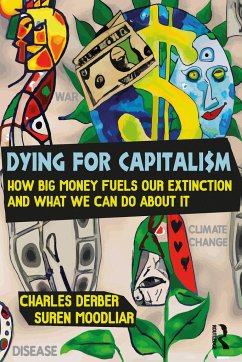
Apocalyptic Narratives
Science, Risk and Prophecy
Versandkostenfrei!
Versandfertig in 6-10 Tagen
43,99 €
inkl. MwSt.
Weitere Ausgaben:

PAYBACK Punkte
22 °P sammeln!
Linking literature from the sociological study of the apocalyptic with the sociology and philosophy of science, Apocalyptic Narratives explores how the apocalyptic narrative frames and provides meaning to contemporary, secular and scientific crises focussing on nuclear war, general environmental crisis and climate change in both English- and German-speaking cultural contexts.In particular, the book will use social identity and representation theories, the sociologies of risk and Lakatos' philosophy of science to trace how our cultural background and apocalyptic tradition shape our wider interp...
Linking literature from the sociological study of the apocalyptic with the sociology and philosophy of science, Apocalyptic Narratives explores how the apocalyptic narrative frames and provides meaning to contemporary, secular and scientific crises focussing on nuclear war, general environmental crisis and climate change in both English- and German-speaking cultural contexts.
In particular, the book will use social identity and representation theories, the sociologies of risk and Lakatos' philosophy of science to trace how our cultural background and apocalyptic tradition shape our wider interpretation, communication and response to contemporary global crisis. The set of environmental and other challenges that the world is facing is often framed in terms of apocalyptic or existential crisis. Yet apocalyptic fears about the near future are nothing new. This book looks at the narrative connections between our current sense of crisis and the apocalyptic.
The book will be of interest to readers interested in environmental crisis and communication, the sociology and philosophy of science, and existential risk, but also to readers interested in the apocalyptic and its contemporary relevance.
In particular, the book will use social identity and representation theories, the sociologies of risk and Lakatos' philosophy of science to trace how our cultural background and apocalyptic tradition shape our wider interpretation, communication and response to contemporary global crisis. The set of environmental and other challenges that the world is facing is often framed in terms of apocalyptic or existential crisis. Yet apocalyptic fears about the near future are nothing new. This book looks at the narrative connections between our current sense of crisis and the apocalyptic.
The book will be of interest to readers interested in environmental crisis and communication, the sociology and philosophy of science, and existential risk, but also to readers interested in the apocalyptic and its contemporary relevance.














